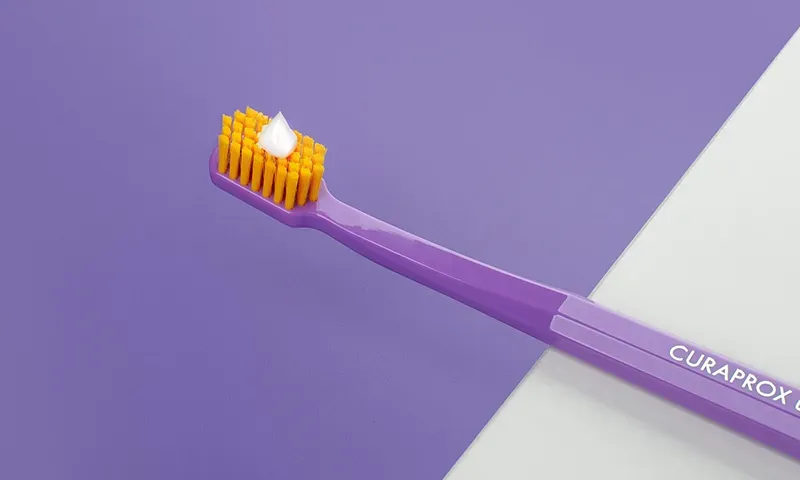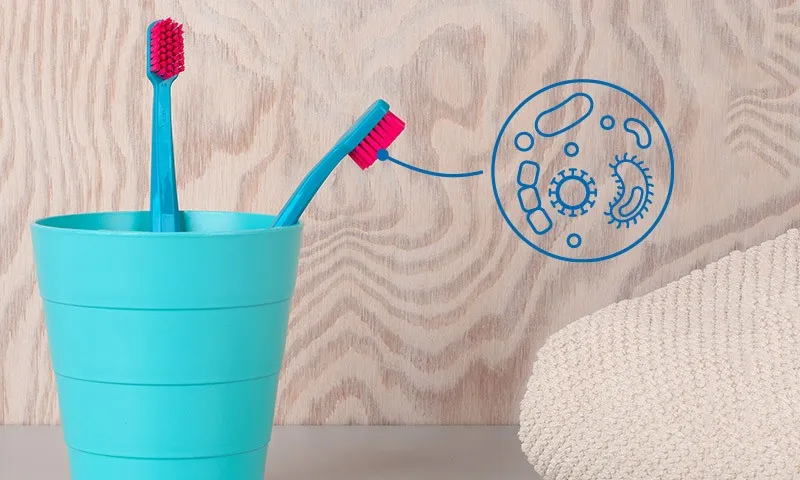Symptoms
Jaw pain can manifest itself as limited jaw mobility. Sufferers often hear a clicking or popping sound or feel discomfort and grating in the jaw joint (temporomandibular joint). When these symptoms occur, chewing, talking and yawning may be uncomfortable or even painful.
Accompanying symptoms
Jaw pain is often accompanied by other symptoms that can vary greatly from person to person. Sometimes their intensity is mild, faint or barely perceptible.
Depending on the severity of the pain, it is wise to seek specialist medical attention to ensure appropriate treatment and to prevent potential complications developing.
Toothache
Toothache is a common accompanying symptom of jaw pain. The pain radiates from the jaw joint to the affected tooth and is accompanied by an unpleasant sensation of pressure. A cause of this could be excessive forces acting on the jaw joint, leading to irritation or inflammation. Dental decay, abscesses or gum disease (gingivitis) are other possible reasons for the pain.
Headaches
Headaches can come in a variety of forms, ranging from a dull sensation of pressure to severe migraine attacks. One possible cause could be adverse stress on the jaw joint, leading to muscular tension in the neck and shoulder area. The muscles in this area are closely connected to the jaw joint and any sensation of pain may radiate to your head. Inflammation or osteoarthritis usually indicates excessive forces acting on the jaw joint.
Ear pain
An inflamed jaw joint near the ear may cause ear pain. This can also be triggered by infection and inflammation of the middle ear or irritation of the auditory nerve due changes in the jaw joint. One-sided ear pain, on the other hand, is usually the sign of a jaw joint disorder on that side of the head.
Throat pain
Accompanying throat pain generally arises from inflammation of the neck muscles caused by adverse stress on the jaw joint. Inflammation of the salivary glands can also cause throat pain since they are located very close to the jaw joint.
Trouble swallowing
If you experience trouble swallowing accompanied by jaw pain, it could well be a sign of tension or blockage in the jaw joint. This tension can adversely affect the neck muscles and make swallowing difficult. You may also experience trouble swallowing if your salivary glands are inflamed.
Back pain
The jaw joint is connected to the muscles of the neck and shoulder, which go all the way down to the lower back. A blocked jaw joint can lead to tension and back pain.
Eye pain
If your jaw joint is tight and stiff, it can cause tension in the muscles responsible for eye movement. Massaging or stretching the muscles around your jaw may help to relax them and relieve the eye pain.
Pain points
Jaw pain can affect different points on the body – for example, the jaw joint, teeth or muscles.
Understanding the various pain points helps to identify the cause of the discomfort and pick the right treatment. Good oral hygiene, stress management and stretching exercises help to relieve jaw pain or prevent it altogether.
On one or both sides
Jaw pain may affect one or both sides of your face and vary in intensity. Such issues are a common symptom of jaw joint problems and can be attributed to a number of factors. One-sided jaw pain can, for example, be the result of a defective position of the jaw joint, which leads to excessive forces acting on the actual joint.
However, jaw pain on one side of your face can also indicate a tooth infection or dental decay.
The pain either spreads to your ear or originates in the ear itself. Yet another possible cause of one-sided jaw pain is tension in the muscles around your jaw. Muscle tension may often occur only on one side of your face up to the temple area.
Time points
Jaw pain can occur at any time of the day or night. A good posture, relaxation techniques and the right sleeping position can help to stop jaw pain before it even starts.
Sudden jaw pain
Injuries, for example if you have knocked or fallen on your jaw, can cause severe discomfort. A cracked tooth or an inflammation of the root is also a common reason for sudden jaw pain.
In the evening
Jaw pain in the evening is, in many cases, due to tension in the muscles around your jaw. Poor posture, stress or anxiety can lead to excessive forces acting on your jaw muscles. Regular relaxation exercises – for example, yoga or breathing exercises – help to regenerate the muscles and relieve jaw pain.
At night
If jaw pain occurs at night, it could be down to you clenching or grinding your teeth in your sleep. This is fairly common, particularly among people who suffer from stress or anxiety. Special mouth splints can prevent teeth grinding and are an effective treatment to relieve the muscles around the jaw at night.
After waking up
An incorrect sleeping position can also put strain on your jaw muscles while you are asleep. An orthopaedic mattress and pillow encourage a healthy sleeping position.
Activities
Quite often, unconscious movements can cause the jaw to start aching. Injuries, a defective position or overuse can also be the reason for pain when performing certain activities:
Chewing
Pain when eating can be attributed to improper positioning of the jaw joints or excessive pressure when chewing.
Opening your mouth
Problems opening your mouth can also cause jaw pain. In many cases, the reason is an injury to the muscles around your jaw or a disorder of the jaw joints.
Yawning
Jaw joint problems are more likely if you overstretch your jaw when yawning. This may be due to a disorder of the jaw joints or an injury to the muscles around your jaw.
Lying down
Some people complain of jaw pain, especially when lying down. This can be the result of a poor sleeping position, an incorrect pillow or an inadequate sleeping environment.
Jogging
Jaw pain while jogging can be caused by various factors, such as excessive forces acting on the muscles around the jaw from the repetitive motion of running, improper breathing techniques or tension in the neck and shoulder muscles. In some cases, however, the symptoms of a jaw joint disorder may be related to improper positioning or injury of the jaw joint.
Conditions
Jaw pain can be triggered by specific conditions and may be attributed to various factors.
These include:
Jaw pain in cold weather
Sensitivity to cold promotes jaw pain. Exposure to cold weather without adequate protection, such as a warm scarf or hat, can place stress on the jaw muscles and lead to pain. It is, therefore, important to keep your jaw warm, especially in cold weather.
Jaw pain after drinking alcohol
Alcohol can also trigger jaw pain. The consumption of alcoholic beverages causes the muscles around the jaw to relax, and this can lead to pain. Further, alcohol's ability to disrupt the supply of blood to the jaw can also be a source of pain in some individuals.
Possible causes
Quite often jaw pain is directly related to problems with your muscles or teeth. Other causes are related to the heart, a COVID-19 infection or serious illness.
Heart attack
Jaw pain can also indicate a current or past heart issue. Heart attacks, for example, are caused by the blood supply to the heart being suddenly interrupted. Besides pain in the chest, back and down your arms, jaw pain may also indicate that you are having a heart attack. Obviously, though, if you do not belong to the at-risk group, jaw pain does not always mean you are having a heart attack. Most likely there is another cause for the pain.
Common cold and influenza
Jaw pain is often a symptom of a common cold and influenza. This pain is generally caused by swollen lymph nodes in the jaw area. A cough, runny nose and fever can all lead to jaw pain. Fortunately, it most often resolves itself as soon as the infection clears up.
COVID-19
Jaw pain can be one of the many symptoms of a COVID-19 infection. In this case, the virus attacks various parts of the body and can cause inflammation in the jaw joint.
Migraine
A pain in your jaw may in fact be a type of migraine pain. It is usually felt as an intense, throbbing or pounding pain affecting one side of the head. This pain may be accompanied by other symptoms such as nausea and an increased sensitivity to light.
Tension
Tension and tightness in the jaw area are a common cause of jaw pain. The muscles around the jaw tense up as a result of excessive forces acting on the jaw and due to an elevated level of stress. The pain feels like muscle ache or as if your jaw is tight and stiff.
Jaw joint
The jaw joint, which connects the lower jaw to the skull, helps move the jaw up and down and allows for talking, chewing and yawning. Jaw joint dysfunction can lead to pain and discomfort. If you have a problem with your jaw joint, you may feel a dull aching pain or hear a clicking sound.
- Triggered by CMD: A common cause of jaw pain is a craniomandibular disorder (CMD). CMD refers to a dysfunction of the jaw joint and the surrounding muscles. The causes are many and varied, but they all stem from tension in the chewing, head and face muscles. They are exacerbated, for example, by wearing loose or ill-fitting dentures or clenching and grinding your teeth. Symptoms of CMD can include jaw joint pain, jaw clicking, difficulty chewing, headaches and tension in the neck and shoulder area.
- Triggered by clenching and grinding: Another cause of pain in the jaw joint is the involuntary clenching and grinding of teeth. If you regularly clench and grind your teeth – most often during sleep – it can lead to severe pain and tension in your jaw.
Cervical spine
A misalignment of the cervical spine or tension in the muscles can lead to discomfort and pain. This pain tends to radiate from the neck to the jaw and is often described as a sharp shooting pain or sensation of pressure.
Draught
In a vast majority of cases, jaw pain is triggered by a draught. If you are exposed to a cold draught for a long period of time, the muscles around the jaw can tense up and cause pain.
Stress and psyche
People who suffer from stress and other psychological disorders may experience jaw or migraine pain as a result of a build-up of tension and tightness in the muscles. In some cases, anxiety and depression can also lead to jaw pain.
Pregnancy
During pregnancy, hormonal changes and increased body weight can exert pressure on the jaw, thereby leading to pain. As pregnancy progresses, the growing foetus pushes more against the surrounding muscles, leading to increasing discomfort, while the body's centre of gravity also tends to shift.
Since the neck and jaw muscles are connected through muscle chains to the back and hip muscles, tension in one area also has a negative impact on the other. Dental infections during pregnancy can also lead to jaw pain.
Fibromyalgia
Fibromyalgia – also known as soft tissue rheumatism – is a chronic condition that causes pain and discomfort throughout the body, including the jaw. People suffering from fibromyalgia often have complaints originating from muscles and connective tissue surrounding the muscles. This pain may be felt as a dull ache, a sharp shooting pain or a burning sensation in the jaw area. Other symptoms of fibromyalgia include fatigue, problems sleeping and difficulty concentrating.
Inflammation
Inflammation is a common cause of jaw pain. If left untreated, inflammation can spread and cause discomfort.
Gum disease (gingivitis)
If the gums are inflamed, the infection can spread to the jaw. The symptoms can include a dull ache or sharp shooting pain in the jaw area.
Inflammation of the middle ear
An ear infection can frequently be felt in the jaw. The pain radiates from the ear through the jaw to the face and is perceived as sharp pain or a sensation of pressure.
Sinusitis
Sinusitis, also referred to as a sinus infection, often results in jaw pain. Your sinuses are located right next to the jaw. If they become infected, the infection usually spreads to your jaw, often causing pain and distress. The pain is normally described as a sensation of pressure in the jaw or a dull ache that affects the whole face.
Maxillary sinusitis
Maxillary sinusitis is one type of sinus infection. The maxillary sinuses are located above your jaw and can lead to problems in the entire jaw area if they become inflamed.
Good to know:
Taking care of your gums is essential if you want to enjoy better oral health, which in turn benefits your whole body. Learn more in our ultimate guide for gum care.
Cancer
Although uncommon, jaw pain may be a sign of cancer in the jaw area or oral cavity. A tumour in this part of the body produces discomfort that is felt as a dull aching or sharp pain. Further, jaw pain can also be a side effect of cancer treatment, such as chemotherapy.
Rheumatism
Rheumatism is an inflammatory disorder that frequently results in discomfort and pain within the joints and muscles. If the jaw is affected, it usually presents as a dull aching or sharp pain.
Menstrual period
Some women experience jaw pain when on their period. Changing levels of hormones throughout the menstrual cycle may cause both tension headaches and jaw discomfort.
Dental treatment
Due to their close proximity to the jaw, dental treatment and restorative procedures in the oral cavity increase the risk of patients developing associated complications, for example:
Wisdom tooth surgery and tooth extraction
Wisdom tooth surgery and tooth extraction commonly result in a dull aching or sharp pain in the jaw area. The pain may present itself immediately after surgery and, in the worst case, last for weeks or months. Typically, post-operative symptoms clear up quite soon as a result of the body's natural healing powers or aided by certain medications.
Filling
Regardless of the material used, filling a hole (cavity) in a tooth, be it with amalgam, dental composites or cement, or indirect inlays made of gold alloy or ceramic, can trigger jaw pain. This can be down to the actual procedure or dentine hypersensitivity resulting from the dental work.
Root canal treatment
Root canal treatment can also cause jaw pain. An inflamed nerve in a tooth can present itself as pain that radiates to the jaw region.
Dental cleaning
Jaw discomfort following dental cleaning commonly arises from excessive stretching during the hygiene procedure.
Grinding down teeth
Much like dental cleaning, grinding down teeth – for example, when fitting a crown – can cause pain if the jaw is excessively strained during the procedure.
Dental braces
Jaw pain may also be an unwanted side effect of wearing braces, especially when reinserting or adjusting them. Typically, any discomfort disappears within a few days or weeks, as the teeth become accustomed to the new position of the braces.
Good to know:
You want to feel the relief of stopping sensitive teeth pain? You want to learn from the Curaprox experts about sensitive teeth symptoms, how to prevent them, what causes them and what you can do about it? Then check our guide to sensitive teeth pain relief.
Treatment: How to combat jaw pain?
Jaw pain is unpleasant and can disrupt your daily life. Fortunately, there are a variety of ways to combat jaw pain and to start feeling better quickly. Various treatment methods, including painkillers, physiotherapy, home remedies and alternative therapies, like homoeopathy, offer a number of potential ways forward.
When should you consult a health care professional?
It is important to promptly seek medical help if the pain is not manageable or getting worse, or if it is accompanied by other symptoms like a high temperature or swelling. In some cases, jaw pain may indicate a critical condition that requires appropriate medical care.
Which health care professional should you see?
In most cases, a dentist or an orthodontist is the best option. However, if the pain arises from a medical condition, it is advisable to consult either a general practitioner or a specialist.
Pills and painkillers
Painkillers such as ibuprofen, paracetamol or aspirin can be an effective way to relieve jaw pain and discomfort. It is, however, crucial to follow professional advice and the instructions on the leaflet provided to avoid any adverse reactions or dosage errors.
Cortisone
In some cases, short-term treatment with a course of cortisone may help to combat the pain. Cortisone is a hormone that can reduce swelling (inflammation) and pain. That said, cortisone should only be taken under medical supervision.
Mouth splint
A mouth splint is a customised plastic guard that fits precisely over the upper and lower teeth to even out the pressure throughout your jaw. Mouth splints are an effective way to reduce jaw pain, especially if the discomfort is due to the jaw joint or night-time teeth grinding.
Physiotherapy
In case of tension in the jaw muscles or dysfunction of the jaw joint, or craniomandibular disorder (CMD), physiotherapists employ exercises and massage techniques to loosen and stretch the muscles around the jaw and neck area. Learning to keep a good posture and incorporating relaxation exercises into your daily routine are effective ways to reduce jaw pain and prevent it from coming back.
Massage
A gentle massage can help to relax the muscles around the jaw and relieve any pain. For the best results and to avoid putting further stress on the jaw joint, it is recommended that a skilled specialist administers this type of massage. Essential oils, such as lavender or peppermint oil, can be used for your body to fully absorb the benefits of the massage.
Taping
Tape treatment can help to stabilise the jaw joint. The tape is applied across the affected area and relieves pressure from the muscles. It is crucial to have a medically trained professional apply the tape to prevent the joint from being exposed to any strain.
Home remedies
Needless to say, traditional home remedies can also be a great way to alleviate jaw pain:
Heat
Heat is very beneficial when it comes to relieving tension in the muscles around the jaw and lessening and banishing jaw pain. You may find that heat, such as warm compresses or a hot water bottle, placed on the affected area will ease the pain. A warm bath can also help to relax the muscles. Always be sure to use the appropriate temperature to avoid burns.
Ginger
Thanks to its anti-inflammatory and pain-relieving properties, ginger, or rather the gingerols it contains, has been a trusted home remedy for jaw pain across generations. Further, ginger boosts blood circulation and relieves tension in muscles. There are many ways to incorporate ginger into your diet: you can chew on it, drink it as a soothing infusion, use it as a spice in dishes or even take it as a dietary supplement. Despite its many benefits, an excessive intake of ginger can lead to adverse side effects due to its blood-thinning properties.
Homoeopathy
Homoeopathic remedies, such as arnica or belladonna globules, may help to relieve pain and discomfort in the jaw joint. However, it is important to consult a skilled specialist to pick the right treatment and to avoid potential bad interactions with other medicines.
Botox
In severe cases, jaw pain may be reduced through treatment with Botox. Botox injections have a paralysis effect on the muscles they are targeting, thereby helping to alleviate jaw pain. In theory, Botox treatments should only be performed by a fully qualified medical professional.
 Swiss premium oral care
Swiss premium oral care







